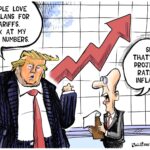Tax Reform and the Target on Entitlements
The Republicans have targeted entitlements for cuts because they are our biggest expense. Yet, the interest our government pays on its debt will surpass entitlements by 2050. That’s because of the ballooning deficits caused by the GOP tax cuts and the need to fund them with more debt, which underscores the critical need for comprehensive tax reform.
The Economic Risks of Ignoring Tax Reform
Our economy is robust, unemployment is near an all-time low, and wages are up. There was no reason to risk it all with tax cuts. If the Republicans are so worried about the cost of entitlements, they should have also worried about the cost of our debt service. They should have left well enough alone.
The Unavoidable Impact of Higher Deficits and Tax Reform
{mosads}Higher deficits are now unavoidable. Even Secretary of the Treasury Steven Mnuchin has acknowledged that growth will not cover the $1.5 trillion of revenue lost from the cuts. The Office of Management and Budget projects that the federal debt will grow close to the size of the U.S. economy within 10 years as a result of GOP tax reform.
Projected Costs of GOP Tax Reform
The cost of the Republican tax cuts, taking into consideration any resulting economic growth, is projected to be $1 trillion by the bi-partisan Joint Committee on Taxation, $1.39 trillion by the Penn Wharton model, and $516 billion by the Tax Foundation. Without growth, those amounts are $1.63 trillion, $1.64 trillion and $1.78 trillion, respectively.
Economic Experts Warn About the Consequences of Tax Reform
New York Fed President William Dudley, a key architect of the U.S. Central Bank’s decade-long response to the financial crisis, says the tax cuts can provide only a modest boost and are expected to “balloon the deficit by $1.5 trillion” over 10 years.
Corporate Responses to Tax Reform: Mergers and Buybacks
The promise of job growth is also shaky. Rather than using the cash windfall from corporate tax cuts to invest and hire, corporations are using it to go on a shopping spree. They are acquiring or merging with other companies and buying back their stock.
The Long-term Effects of Tax Reform on Workers and the Economy
Those strategies won’t help workers or the economy. In fact, mergers and acquisitions generate job loss instead of job growth, since managers fire employees to eliminate overlap in the surviving entity. Stock buybacks deprive the economy of capital — an important fuel for growth.
Tax Reform and the Rise of CEO Compensation
But mergers and stock buybacks do help CEOs because they drive up earnings per share, enabling CEOs to get paid more. So it’s no surprise that corporations have spent $6.9 trillion of profits on stock buybacks since 2004, or that they spend trillions each year on mergers and acquisitions. It was utterly predictable they’d do it again. In fact, it was predicted it in November.
Historical Perspective: Tax Reform and Economic Growth
History shows no consistent correlation between tax rates and economic growth. We even experience job loss during low tax periods. That increases the risk of recession because no growth or negligible growth will lead to even larger deficits, higher borrowing costs and declining GDP.
Future Economic Projections Under Tax Reform
The CBO projects that interest rates will triple over 10 years. The government will pay $818 billion in interest in 2027, and a total of $5.6 trillion in interest over the next 10 years. Debt service will be the third largest cost in the federal budget by 2026, the second by 2046, and the largest — surpassing entitlements — by 2050. Foreign investors are likely to demand even higher rates on Treasury securities just based on supply and demand.
Tax Reform’s Broader Impact on Interest Rates and Consumer Spending
We will experience higher rates across the board, including on residential mortgages and corporate and consumer borrowing. Rates will be a drag on home buying, housing starts and consumer spending, which is two thirds of the economy. This is bound to lead to a recession, which like the rest of GOP tax reform will hit the middle class the hardest and widen income and wealth inequality in America.
The Uncertain Benefits of Tax Reform and Low Unemployment
The Republicans’ mantra that the tax cuts will lower unemployment much below its present level is unrealistic given how low it is already. But even if they do, as Mr. Dudley warned, the Fed may worry about inflation and have to stymie growth by raising rates.
The Irony of Tax Reform During Economic Prosperity
Why do the Republicans choose to lower taxes when our economy is robust, unemployment is at near-record lows, fewer Americans are living below the poverty line and wages are increasing? Why would they threaten it all? What happened to the party of fiscal responsibility?
The Political Motivations Behind Tax Reform
Sadly, I think the answer is that the Republicans wanted to keep a campaign promise — especially after failing to repeal the Obamacare — more than they wanted to do what’s right for the country.
The Historical Contrast: Democrats vs. Republicans on Tax Reform
For years, the Republicans have painted the Democrats as the party of profligacy — the party that spends, spends, spends. Indeed, just eight years ago, the Republicans viciously attacked President Barack Obama’s $787 billion economic stimulus plan as irresponsible. But history shows that Republican administrations have consistently been more profligate spenders than Democratic ones.
Now with tax reform positioned to balloon deficits, the GOP’s most consistent criticism of Democrats will become a self-fulfilling prophecy. No matter which party is in control, raising taxes is inevitable.








